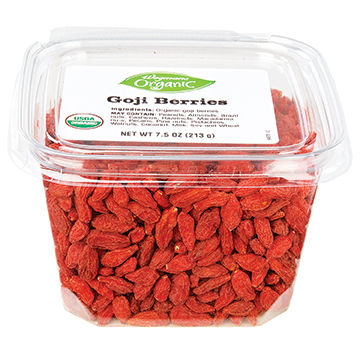SNACKS
BREAKFAST AND BRUNCH
Goji Berry
Goji berries, also known as wolfberries, are small, vibrantly red-orange fruits native to Asia, particularly in China and Tibet. Boasting a slightly sweet and tangy flavor with a botanical aftertaste, these berries have been prized for their health benefits in traditional Chinese medicine for centuries. The berries are packed with essential nutrients, including vitamins A, C, and E, minerals, and antioxidants, contributing to overall wellness, immunity, and eye health.
Dried goji berries are a versatile ingredient often found in trail mixes, breakfast cereals, salads or smoothie bowls, and can even be brewed as a tea. When rehydrated, the berries plump up for a chewy texture, making them a healthful addition to a variety of dishes such as baked goods and cooked savory dishes.
84%
CARBS
0%
FAT
16%
PROTEIN
240 Goji Berry Products
Wegmans Organic Goji Berries
Organic Fully Charged Dried Goji Berries Supersnacks
Bag, 8 Servings — Organic, Non-GMO, Sun-Dried, Sulfite-Free
BareOrganics Raw Sun-Dried Goji Berries
Bag, 4 Servings - Organic, Non-GMO, Sun-Dried, Sulfite-Free
Made in Nature Organic Sun Dried Goji Berries, Non-GMO, Gluten Free, Unsulfured, Vegan Snack
H-E-B Organics Goji Berries
Goji berries
tesco Goji berries
Navitas Organics Organic Goji Berries
Goji Berry Is Frequently Used With
Goji Berry FAQ
Goji berries have a unique blend of sweet and tart flavors that can elevate the taste profile of many recipes, from trail mixes and salads to smoothies and baked goods. People often struggle to incorporate these tiny, dehydrated powerhouses into their food efficiently as they can be a bit hard and chewy in their dry state. The secret is rehydration. Before using dried goji berries, soak them in hot water for 5-10 minutes. Once they've rehydrated & plumped up, you can add them to cold or hot cereals, salads, yogurt, and trail mixes. Or, use them as you would use raisins in baked goods. Also, boiling goji berries for a homemade tea is a great way to extract their nutrients.
Little known tip is that you can also use them as garnish to your cocktails or lemonades for that extra pop of color and slight tangy flavor. In the realm of savory, goji berries pair well with quinoa and roasted vegetables or can add a sweet contrast in a stir-fry or stew. Hydrated goji berries can also be pureed and used in sauces or spreads. They're not just for health drinks or protein bars!
Can I eat goji berries raw?
What do goji berries taste like?
Can goji berries be used in baking?
Is goji berry tea good for you?
Can goji berries help with weight loss?
Can I use goji berries in savory dishes?
Are goji berries keto-friendly?
Can goji berries be harmful?
Are goji berries gluten-free?
What is a good substitute for goji berries in a recipe?
Expiration & Storage Tips
When does goji berry expire?
Unopened, a sealed bag of goji berries should last for about 1-2 years, so long as they're stored in a cool, dark, dry place. Once the bag is opened, the berries can last up to a year, depending on the storage. Homemade dried goji berries, without added preservatives, have a much shorter shelf life, often lasting for 2-3 weeks. If you choose to freeze your goji berries, they can last in the freezer for up to 12 months. However, the texture may change slightly upon defrosting.
How do you tell if goji berry is bad?
If not properly stored, goji berries can become moldy over time. Always visually inspect your berries, looking for signs of discoloration or fuzzy spots. If they appear darker than usual, or have mold growth on them, then they should be discarded. The smell can also be a telltale sign; a strange or off-putting smell means the berries are no longer good. Additionally, if the berries are overly hard or dessicated, it's better to toss them out.
Tips for storing goji berry to extend shelf life
• Store goji berries in a cool, dry, and dark location to preserve their quality.
• Keep them in a tightly sealed bag or container to prevent exposure to air which can spoil them faster.
• If you've made homemade dried berries, consider keeping them in the refrigerator to extend their shelf life.
• If freezing, place berries in a freezer-safe bag, remove as much air as possible, and store flat in the freezer. Defrost berries overnight in the fridge when ready to use. Note that the texture may change slightly after freezing.
• For long term storage, consider vacuum sealing your bag of berries, as this can drastically extend their shelf life.
EXPIRES WITHIN
8 - 11
MONTHS
Substitutes

Raisin

Sultana Raisin

Golden Raisin

Dried Currant

Dried Cherry

Dried Mulberry

Dried Berries

Dried Raspberry

Dried Strawberry

Dried Blueberry
See All
Health Info
Macros
21g
CARBS
0g
FAT
3g
PROTEIN
Allowed on these diets
LOW FAT
HIGH CALCIUM
VEGETARIAN
PALEO
WHOLE 30
MEDITERRANEAN
VEGAN
LACTOSE FREE
GLUTEN FREE


























